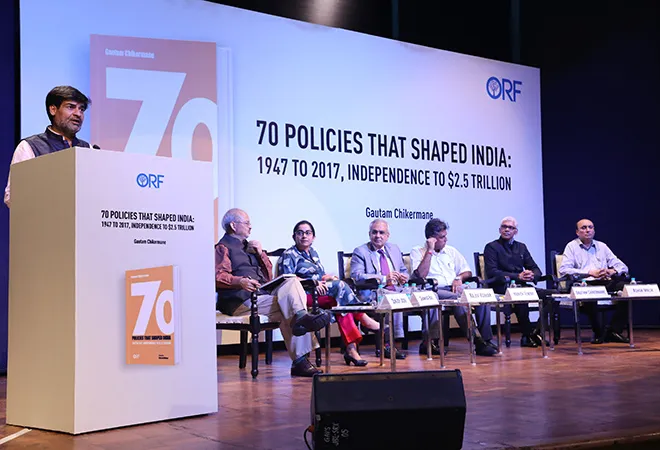-
CENTRES
Progammes & Centres
Location
Focused primarily on the Indian economy, Gautam Chikermane's new book, 70 Policies, also explores the impact of external influences — legal, political and administrative — on Indian policymaking. Following is the speech by ORF President during the launch of the book earlier this week.

Image Source: Photolabs@ORF
Dr. Rajiv Kumar ji, Vice-Chairman of NITI Aayog, Sri Manish Tiwari ji, eminent lawyer and spokesperson of the Congress party, Sri Ashok Malik, Press Secretary to the President, Dr. Shamika Ravi, Mr. Sunjoy Joshi, friends, colleagues, ladies and gentlemen — on behalf of Observer Research Foundation, it is my honour and privilege to welcome you this evening.
We are here, of course, to celebrate the launch of my colleague Gautam Chikermane’s book, 70 Policies that Shaped India: 1947 to 2017, Independence to $2.5 Trillion. A very compelling chronicle of the life of India since its Independence. Let me congratulate Gautam for this publication that is both comprehensive and pithy. Writing, at its very best, is about communicating complex ideas in an accessible and comprehensible format. I believe that Gautam might have actually achieved this remarkably well with 70 Policies.
He has managed to distill some of India’s most contentious economic debates into a manuscript that can serve the needs of everyone — from government to industry to academia.
I would like to remind the audience that Gautam’s masterful work is only the latest addition to his long and illustrious career. Building on his multiple personas — as a journalist, editor, an economic pundit and author engaging with mythology and ethics, Gautam, with this, has established himself as a formidable scholar; his description of each of the 70 reforms in just 350 words deserves applause not only for his masterful prose, but also for his diligent research, reflected in the 683 citations that allow the reader to uncover the provenance of each of his interventions.
Indeed, the book lets the reader decide if they’re happy with just a peek — or if they’d like to dive headfirst into the debates that have shaped India’s political economy. Only an individual with great clarity of thought could have made this possible.
Having said that, I cannot fail to point out that Gautam’s true love continues to remain the complexities and subtleties of India’s greatest epic: the Mahabharata. And I hope public policy will give him enough room to engage with that pursuit as well.
Gautam’s book provided me with some unique perspectives, three of which I would like to share by way of the introduction to the book:
First, the book very ably chronicles the evolution of India’s left of center economy policy making. It reveals to us that while the 1990s and the 2000s certainly saw a break from the orthodox central planning that bottlenecked our economy for the latter half the 20th century, India’s full embrace of the market remains hostage to the firm grip of our socialist ethos even today. Perhaps this is a reflection of who we are. Is this the New Delhi consensus?
Second, the book truly gives meaning to the words “past is prologue.” By gleaning insights from the errors of the past, it provides a clear guide for future generations of policy makers, entrepreneurs, business leaders and scholars to learn from. The book now serves as a permanent reminder that the unintended consequences of populist policy making can and will implicate India’s full potential as an economic power. A number of policies of the past remind of this.
And finally, it would be amiss to believe that the book servers merely as a chronical of our economic history. By exploring these 70 policies, whether it is the nationalisation of banks or the recently introduced GST, the reader gets a clear sense of the evolution of India’s political climate. Indeed, this book is as political as it is economic — and all its readers are better off for it. The political evolution is remarkably discernible.
Both Gautam and I hope that many of the vignettes captured in this book will continue to breed constructive introspection and help catalyze new ideas.
Of course, many of our ORF’s own initiatives will benefit immensely from a closer study of this book.
Gautam’s writing on the Jan Dhan Yojana and the Aadhaar initiative, for example, are relevant to our work of financial inclusion and the broader evolution of India’s digital economy. And his work on contemporary reforms such as the Insolvency and Bankruptcy Code and the GST will certainly inform our initiatives of India’s economic policy.
I am certain that scholars, research organisations and members of our government will similarly find that his book adds great value to their own efforts.
Ultimately, the book reminds us that while history does not repeat itself, it does rhyme. India’s once protectionist and isolationist stance is gradually giving way to a nation that is beginning to embrace the full potential of its economic growth and yet the shadows of our past create hesitancy in our progress.
It is my hope that everyone gathered here today will find learning from it as enjoyable as I have.
The views expressed above belong to the author(s). ORF research and analyses now available on Telegram! Click here to access our curated content — blogs, longforms and interviews.

Samir Saran is the President of the Observer Research Foundation (ORF), India’s premier think tank, headquartered in New Delhi with affiliates in North America and ...
Read More +